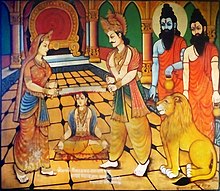According to Indian folklore, Mordhwaj or Mordhwaja or Murddhawaja (Sanskrit: मोरध्वज) is an ancient king of the Mahabharata period, who is believed to have been blessed by Krishna.[3][4]
| Mordhwaj | |
|---|---|
 | |
| Based on | Mahabharata |
| In-universe information | |
| Full name | Raja Mordhwaj |
| Gender | Male |
| Occupation | King |
| Family | Haihaya dynasty[1] |
| Spouse | Padmavati[2] |
| Children | Tamradhwaj |
Legends
editAccording to regional folklore, Mordhwaj was a devotee of Krishna and a great donor. Arjuna was proud that there is no greater devotee of Krishna than him. After Mahabharata War was over, Lord Krishna told Arjuna that I have a devotee greater than you and that is Mordhwaj. Krishna reached King Mordhwaj in a Brahmin disguise and said that Maharaj, my lion, is hungry and he is a cannibal. The king Mordhwaj said that if I would be his food, it will be my fortune. Krishna said that both of you, husband and wife, should cut off the head of your son and feed him meat. In the meantime, even a single tear comes out; then, the lion will not eat it. Thus the king Mordhwaj and his queen cut off their son's head and put it in front of the lion. Then Krishna blessed king Mordhwaj and his son was resurrected. Thus the king tested his devotee and Arjuna's pride was shattered.[5][6] The descendants of Tamradwaj lives in Tamluk, West Bengal
Temples
editA new temple has also been built near the ancient fort on the bank of Saryu River in Aalapur tehsil of Ambedkar Nagar district of Uttar Pradesh. In the Temple - Idol of King Mordhwaja along with his wife and son can be seen in a special stance which portrays the story of King Mordhwaj. A large number of devotees reach here every Sunday for bathing and worship. Chadipur Fort has its own special identity in the adjoining districts including Ambedkar Nagar, Azamgarh and Gorakhpur. Sadhus and saints from far-flung areas keep reaching this holy ghat throughout the year for worship.[7]
A temple dedicated to Mordhwaj is located in a village called Moonj in the Etawah district of Uttar Pradesh.[8][3]
Mordhwaj established the Bageshwar Nath Shiv Temple at Arang in Raipur District of Chhattisgarh in the 11th century.[9]
Mahamaya Mandir, a 1400 years old temple at Ratanpur in Bilaspur district was also built by King Mordhwaj. According to its priest Pandit Manoj Shukla, King Mordhwaj had built 36 forts in Chhattisgarh. After the construction of every fort, he used to build a temple of Mother Mahamaya. One of these temples is the Mahamaya temple located in Raipur, where Mother Mahamaya and Samleshwari Devi are viewed as Mahalaxmi.[10]
Forts
editMayurdhwajj fort located in ancient Tamhralipta City, nowadays known as Tamluk, Mednipore District, West Bengal.[11][12]
References
edit- ^ Alexander Cunningham (1884). Report of a Tour in the Central Provinces and Lower Gangetic Doab in 1881-82. p. 74.
- ^ Sirohi, Dimple (August 22, 2019). "यहां टूटा था अर्जुन का अभिमान, श्रीकृष्ण ने ली थी राजा मोरध्वज की परीक्षा" (in Hindi). Amar Ujala.
- ^ a b Verma, Amit (February 14, 2017). "Why a visit to this village temple is a must for politicians before polls". Asian Age.
- ^ Mathur (2006). Kuchamaṇi Khyal An Endangered Folk Theatre Style of Rajasthan. pp. 19, 62.
- ^ Yuvraj (23 August 2019). "यहां भगवान कृष्ण ने ली थी मोरध्वज की परीक्षा, तोड़ा था अर्जुन का घमंड" (in Hindi). Hindustan.
- ^ "Kalavati learns lesson from Satyanarayan Pooja oath". TellyChakkar. 7 December 2020.
- ^ "50 लाख से होगा राजा मोरध्वज किले का सौन्दर्यीकरण" (in Hindi). Amar Ujala. October 9, 2019.
- ^ Shalabh (January 21, 2017). "A little off the expressway, a blessed king's temple fulfils". The Times of India.
- ^ Gupta, Ashish (July 31, 2018). "राजा मोरजध्वज ने की थी महादेव के इस प्राचीन मंदिर की स्थापना, जुड़ी हैं कई रोचक कहानियां" (in Hindi). Patrika.com.
- ^ "1400 साल से महामाया मंदिर में पत्थर की चिंगारी से जला रहे हैं मुख्य ज्योत, राजा मोरध्वज ने बनवाया था ये मंदिर" (in Hindi). Daily Bhaskar. 2020.
- ^ Kharkwal, S. C.; Sharma, G. C. (1990). Land and Habitat, a Cultural Geography A Study in Garhwal Bhabar. Nutan Publications. p. 56.
- ^ "पर्यटन के रूप में विकसित नहीं हो सका राजा मोरध्वज किला क्षेत्र" (in Hindi). Dainik Jagran. September 27, 2020.